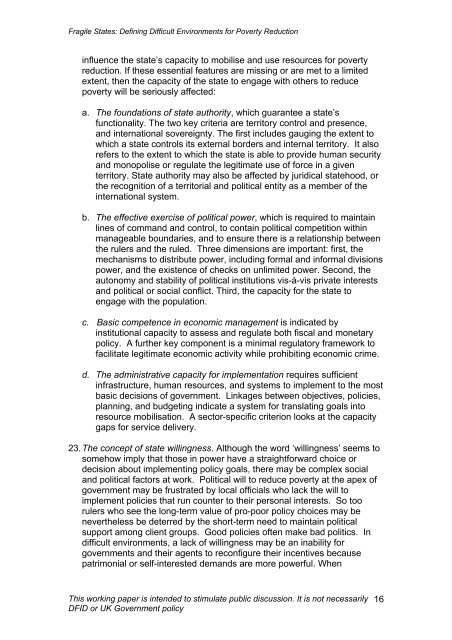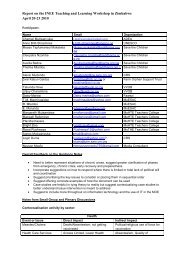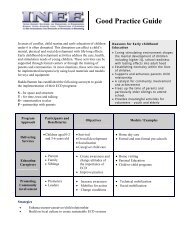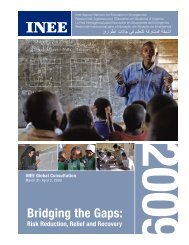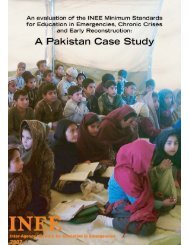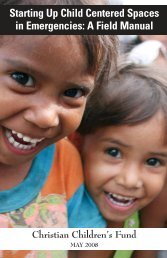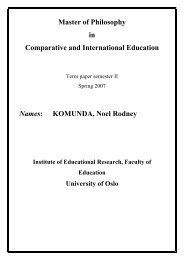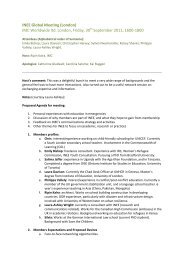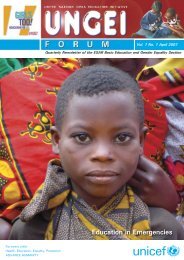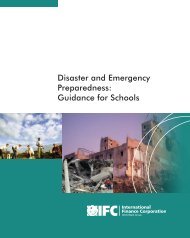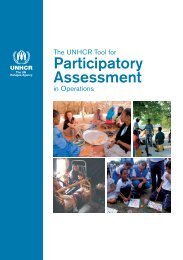Fragile States: Defining Difficult Environments for Poverty ... - INEE
Fragile States: Defining Difficult Environments for Poverty ... - INEE
Fragile States: Defining Difficult Environments for Poverty ... - INEE
You also want an ePaper? Increase the reach of your titles
YUMPU automatically turns print PDFs into web optimized ePapers that Google loves.
<strong>Fragile</strong> <strong>States</strong>: <strong>Defining</strong> <strong>Difficult</strong> <strong>Environments</strong> <strong>for</strong> <strong>Poverty</strong> Reductioninfluence the state’s capacity to mobilise and use resources <strong>for</strong> povertyreduction. If these essential features are missing or are met to a limitedextent, then the capacity of the state to engage with others to reducepoverty will be seriously affected:a. The foundations of state authority, which guarantee a state’sfunctionality. The two key criteria are territory control and presence,and international sovereignty. The first includes gauging the extent towhich a state controls its external borders and internal territory. It alsorefers to the extent to which the state is able to provide human securityand monopolise or regulate the legitimate use of <strong>for</strong>ce in a giventerritory. State authority may also be affected by juridical statehood, orthe recognition of a territorial and political entity as a member of theinternational system.b. The effective exercise of political power, which is required to maintainlines of command and control, to contain political competition withinmanageable boundaries, and to ensure there is a relationship betweenthe rulers and the ruled. Three dimensions are important: first, themechanisms to distribute power, including <strong>for</strong>mal and in<strong>for</strong>mal divisionspower, and the existence of checks on unlimited power. Second, theautonomy and stability of political institutions vis-à-vis private interestsand political or social conflict. Third, the capacity <strong>for</strong> the state toengage with the population.c. Basic competence in economic management is indicated byinstitutional capacity to assess and regulate both fiscal and monetarypolicy. A further key component is a minimal regulatory framework tofacilitate legitimate economic activity while prohibiting economic crime.d. The administrative capacity <strong>for</strong> implementation requires sufficientinfrastructure, human resources, and systems to implement to the mostbasic decisions of government. Linkages between objectives, policies,planning, and budgeting indicate a system <strong>for</strong> translating goals intoresource mobilisation. A sector-specific criterion looks at the capacitygaps <strong>for</strong> service delivery.23. The concept of state willingness. Although the word ‘willingness’ seems tosomehow imply that those in power have a straight<strong>for</strong>ward choice ordecision about implementing policy goals, there may be complex socialand political factors at work. Political will to reduce poverty at the apex ofgovernment may be frustrated by local officials who lack the will toimplement policies that run counter to their personal interests. So toorulers who see the long-term value of pro-poor policy choices may benevertheless be deterred by the short-term need to maintain politicalsupport among client groups. Good policies often make bad politics. Indifficult environments, a lack of willingness may be an inability <strong>for</strong>governments and their agents to reconfigure their incentives becausepatrimonial or self-interested demands are more powerful. WhenThis working paper is intended to stimulate public discussion. It is not necessarilyDFID or UK Government policy16


